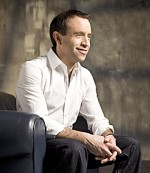Title
Subhead
As Hurricane Sandy subsided but before Juilliard classes (canceled for most of that week) resumed, conductor Mark Wigglesworth spoke to The Journal via Skype. The circumstances brought a heightened consciousness of current events, and technology, to the interview, which might have been distracting. Instead, it seemed almost relevant, as Wigglesworth’s powerful sense of his work’s place in today’s world came to the fore.
Body
Wigglesworth will make his Juilliard debut on February 1 when he closes the Focus! festival with post-1939 music from his native Britain by Benjamin Britten, Michael Tippett, Oliver Knussen, and Mark Anthony Turnage. The conductor, 48, began on a provocative note, referring to Britten and Tippett as “certainly the two best dead British composers.” This seemed less like a slur against Elgar and Purcell than a reflection of his belief that the contemporary music scene in Britain today is extraordinarily rich. “Thanks to Britten and Tippett, the contemporary British musical world is incredibly healthy, and I think we’re in a world of luxury when it comes to not only how many composers of quality there are, but also how varied they are. I think America is similar, but comparing ourselves to the non-English-speaking world, I think we’re very fortunate,” he said.
Wigglesworth’s enthusiasm for contemporary British music isn’t jingoistic, though, and he sees no need for missionary zeal. His passion is for the performance of contemporary music generally—“that says more about us [than older music], not only as musicians but as a culture,” he said. “I don’t feel that just because I’m British I have a responsibility to play British music. I would have been equally happy to play a contemporary American or Scandinavian program.”
The stylistic variety of today’s music, together with the specificity and complexity of notation that have become standard, can make learning large amounts of new music seem daunting. For Wigglesworth, however, the process is ultimately less time-consuming than that of learning older works. The structures and materials of the music of the past may be familiar, but its contents come from and are aimed at a time other than our own; therefore, Wigglesworth said, “although obviously the notes of a Mozart symphony [sink] in quicker than those of a piece by Mark Anthony Turnage, I think it’s easier to identify with what Turnage means than with what Mozart means.” Thus older music occupies most of his study time, which is considerable; Wigglesworth is a dedicated student of the scores he conducts, and spends about half of each year studying (at present his career is entirely devoted to guest conducting). He spoke of his study as seeking to fulfill a sense of responsibility to the composers themselves, a responsibility he values above his duty to the audience—though audiences do not seem to suffer from these priorities.
The question arose of how that responsibility to composers is manifest—is it, for Wigglesworth, about fidelity to scores? To the spirit of a work? To the performing style the composer had in mind when writing? “It’s not just about respect,” he answered. “Musical notation is breathtakingly limited in its ability to represent reality. You can’t just be faithful to a score and expect a great performance. The fascinating thing is that composers expect to be interpreted.” Despite the premium he clearly places on the interpretive process, Wigglesworth is no podium autocrat, and his preparation is not aimed at settling every detail in advance. Particularly because he works as a guest conductor, he doesn’t know what the orchestra’s contribution is going to be—even though he knows it will be invaluable—ahead of time. Therefore his preparation involves becoming aware of many possible ways of approaching a piece, or a passage. He doesn’t wish to express himself at the expense of the musicians, and he compared himself to a GPS, whose thorough knowledge of the map of a piece puts him in a position to either accept the route a player is taking and advise on the next moves, or to suggest an immediate turnaround. “The older you get as a conductor, the better you know the map, and the better you know which routes can be taken without compromising the end goal,” he said.
When working with student orchestras, Wigglesworth tries to choose pieces that allow for possible variations of level within the group, but here, the availability of more rehearsal time than is customary with professional organizations encouraged him in his choice of a very “notey” set of pieces. It’s a program, in short, that reflects both Wigglesworth’s high ideals and his thoughtful pragmatism.





